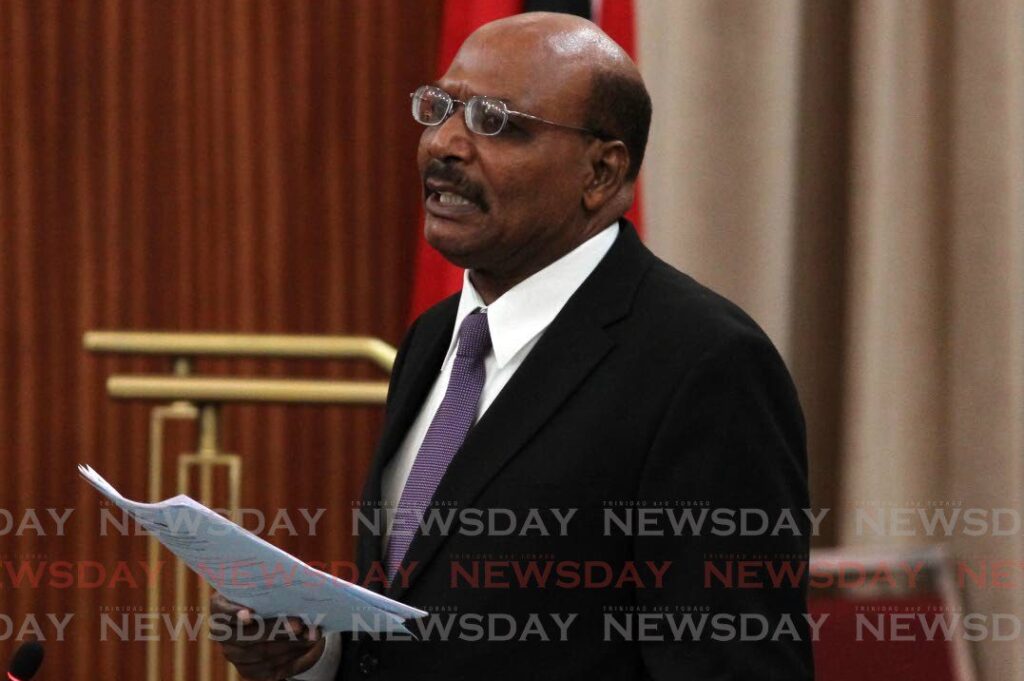Mark slams Government's 'lawless, renegade' spending

DURING the sitting of the Senate on June 11, opposition senator Wade Mark criticised the government's fiscal policies as he expressed concern that government might spend $2.3 billion more than originally planned by the end of 2024.
Comparing the current government's expenditures to those of a former UNC administration, Mark claimed, "I heard the government say the UNC was expending some $67 billion in one particular year. In 2023, this government expended $69 billion. It is in the Auditor General's report."
Mark noted that Minister of Finance Colm Imbert had requested an additional $2.3 billion in supplementary appropriations and claimed Imbert had already admitted the economy was facing "difficult and dangerous waters" owing to falling oil and gas prices and production issues. He said he projected a budget deficit.
"We have a revenue crisis in this country where expenditure and revenue are far apart. The minister is admitting that we could find ourselves with this supplementary appropriation being approved, resulting in a $9 billion budget deficit."
Marks said there was a foreign-exchange-reserve crisis, stressing the gap between the tradable and non-tradable sectors of the economy.
He questioned the allocation of the supplementary budget, saying almost $2.3 billion was going towards recurrent expenditure, but only about $4 million was directed towards the capital programme.
"Where is the value added going to come from? Where is the revenue generation going to come from? Where are the jobs going to come from?" he asked as he criticised the government's optimistic portrayal of the economy.
Mark cautioned about the potential consequences of the fiscal deficit and declining foreign-exchange reserves.
"Standards and Poor’s will be here in July. Depending on their findings, we could face a downgrade. We have to be very careful with this fiscal deficit that keeps mounting and our foreign exchange reserves that keep falling."
He said the Heritage and Stabilisation Fund (HSF) could have been significantly higher if not for the government's previous withdrawals.
Mark said the government lacked transparency and accountability in its employment practices, especially concerning short-term employment.
"In the Auditor General's report for 2022, the government spent $230 million on short-term employment. There is no established policy to determine how people are employed."
Mark claimed the government's employment decisions were influenced by personal connections and party affiliations.
"In 2023, the government spent $300 million on short-term employment, according to the Auditor General. How can that be fair?
"When we ask for answers, we get no positive response."
He called the government "lawless" and "renegade."
Mark also raised concerns about health-care expenditure, and believed the Government would disregard the Chronic Disease Assistance Programme (CDAP).
"The government is indicating that $202 million has to be approved for standing invoices because the creditors give them 90 days."
Mark claimed government was signalling a potential reduction in funding for CDAP, referring to a statement by the Prime Minister in the House of Representatives.
Mark said the PM suggested a reduction of the CDAP allocation from $400 million to $250 million.
He said the Finance Minister said CDAP's spending had increased from seven per cent of revenue in 2007 to 15 per cent in 2024.
Minister of Foreign and Caricom Affairs Dr Amery Browne denied Mark's CDAP claims.
Mark also raised concerns about the National Insurance Property Development Company Ltd (Nipdec) which imports and distributes pharmaceuticals.
Mark questioned whether Minister of Health Terrence Deyalsingh was aware of Nipdec importing pharmaceuticals which he claimed were not properly registered.
Mark said for that to take place, Nipdec needed a special import permit, which could only be issued by the Chief Medical Officer.
Mark spoke about the high cost of certain medications, particularly for prostate cancer. He said only brand-name drugs were being imported, costing $750 per pack, in contrast to generic versions, which cost $240 for a two-month supply, but which he said were not being imported.
Mark said the price gap could prevent ordinary citizens from accessing essential medications.
Mark also questioned the ownership of properties used by Trinidad and Tobago's missions abroad.
He asked whether the millions spent on repairing and upgrading those missions were for properties owned by Trinidad and Tobago. Citing the chancery in London as an example, he called for clarification.

Comments
"Mark slams Government’s ‘lawless, renegade’ spending"